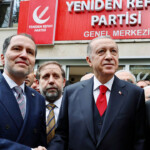‘Not only did the regime win again, thanks to its electoral engineering and certainly to its social engineering, but the victory became tantamount to the regime’s consolidation both in the country and abroad. Stronger than ever thanks to this double legitimacy, inside and outside, the regime is now on a free ride.’
A disastrous elections period is behind us. Disastrous, by all means…
First and foremost, for its consequences on the people who were expecting a change of any kind from Erdoğan’s suffocating rule. The deception is akin to depression.
They have been misguided, abused extensively and all through the process by perfidious politicians, parochial political scientists, arriviste pundits, unethical journalists, and crooks turned pollsters.
All were telling the people that the opposition would win in a landslide right out in the first round on May 14th and chase Erdoğan out. The people happily and voluntarily trusted them, therefore becoming their accomplices in a sort of nationwide pipedream.
The few who were calling for caution, exposing in detail why the fascist dictator would win again, were censored, qualified as incurable pessimists and nefarious defeatists.
The fundamental reason behind this collective fiasco was the deficiency in properly deciphering and grasping the new reality of the Turkish polity.
When betting on the victory, “optimists” were indirectly betting on the normalcy of the regime. They were assuming that all that has happened in Turkey since 2013, when the dictator went berserk and started to design a new regime, was a benign deviation from the norms that will be redressed by voting the usurper out.
This is how and when the top oxymoron “Turkish democracy” appeared in the spotlight. Naïvely presupposing that even unfree and unfair voting would qualify Turkey as a democracy, as U.S. National Security Adviser Jake Sullivan unashamedly uttered after the elections, the “optimists” misled and betrayed the people who eagerly believed them.
The optimists were so full of hope, overconfident, and enthusiastic, that they even started to dream of a solidly democratic Turkey that would show the world how to get rid of a dictator peacefully.
Not only did that not happen, but by the same token it confirmed to the world another portion of the common wisdom: totalitarian leaders don’t leave power through elections.
Alas, the optimists missed the new socio-political reality, which was closing all regular channels leading to a political alternative. The ruling elite came to power through elections; it wouldn’t leave through the ballot boxes.
And this is exactly what happened. Not only did the regime win again, thanks to its electoral engineering and certainly to its social engineering, but the victory became tantamount to the regime’s consolidation both in the country and abroad. Stronger than ever thanks to this double legitimacy, inside and outside, the regime is now on a free ride.
What was happening in Turkey for ten years was an overall socio-political transformation, profoundly altering the fundamental features of the polity. This totalitarian, antidemocratic, and de-westernizing dynamic encompasses the institutions, the majority of the people, and Turkey’s external posture.
In actuality, these actors and their policies are intertwined and operate in concord. To give an example: when Turkey decides to invade Syrian territories, the top institution, the Foreign Ministry is sidelined, the people (including the opposition), are enchanted, and NATO member Turkey gets to be involved in numerous deeds, like supporting ISIL against the Alliance’s and its Western allies’ objectives.
Institutions are cancelled and superseded by the regime’s henchmen. Their relative autonomy has been annulled. As a consequence, their checking and balancing functions have vanished. This goes first for the legislature, which has been turned into a cluster of well-paid backbenchers who docilely rubberstamp the decisions taken at the presidential palace. Their written questions to the executive remain systematically unanswered and they have no right to ask oral questions. As for the key institutions—Academia, the Administration, the Army, the Diplomatic corps, the Judiciary, and the Treasury—they are marginalized and superseded by the advisers sitting in the presidential palace. All critical decisions, beginning with the appointments, are nurtured and executed by the “gurus” who are spearheaded by the strongman, Recep Tayyip Erdoğan.
It is thus no coincidence that Turkey is listed at the rock bottom of international rankings related to rule of law, freedom of speech, press freedom, academic freedom, transparency, Human Rights violations, etc…
The polity is not abused by illegal deeds but a-legal ones; in this sense it suffers from anomia rather than the oft-uttered euphemism: “democratic backsliding.”
As for the people, a quick glance at the elections’ results show a clear majority of the voters preferring antidemocratic and anti-western policies presented by the political parties. Except for the Kurdish Political Movement and a few crumbs from the center right and center left, the country shines with different shades of antidemocratic policies. Looking at the groups in the new parliament, the number of MP’s leaning towards democratic action is barely 100, out of 600.
This in itself constitutes a strong message to those who keep parroting the concept of “one-man rule” to define the Turkish political monster. The elections showed, once again, that it is rather about a “many-man rule” who think like one-man!
This ideological configuration points to a totalitarian drive. Indeed, countless Turkey observers did not manage to make sense of those voters who, despite huge economic woes and a catastrophic post-earthquake response in early February, still voted obediently for the regime and for Erdoğan.
The basic assumption of those Turkey watchers was that impoverishment and a lack of adequate public care following the earthquake would make voters abandon the regime.
With such a background, the picture that emerged after the elections goes far beyond the classical right-left, conservative-progressive, religious-secular polarizations.
Polarization refers to a common democratic ground where differences, divergences, and conflicts, even severe ones, co-exist and are resolved smoothly. In Turkey today, the socio-political interaction between the antidemocratic majority and the rest of the country is elusive and often lethal.
Within the “race to the right” to describe the state of the Turkish polity and the mood of the people, another gimmick appeared right after the elections: nationalism! This cliché means anything and nothing and has become a truism over the years. Frankly, how many of world’s citizens aren’t nationalist?
Nowadays, nationalism has become a fig-leaf to excuse a hate-driven, segregationist fascism that excludes from the very corpus of the nation anybody who doesn’t comply with the national criteria decreed by a despotic majority. In Turkey, that corresponds to a “Sunni Straight Male Turk.”
Finally, for relations with the external world, such a polity remains potentially expansionist, aggressive, and imperialist, as it has already demonstrated on several occasions over the course of the last ten years.
Today, citizens of Turkey are busy preparing themselves to put up with the regime by “understanding” and “normalizing” its policies and practices. Abroad, Turkey’s allies and neighbors are looking politely and in a cowardly manner for ways of living with this “other evil” (next to Russia) at Europe’s doorstep.
The views and opinions expressed above are the author’s and do not reflect those of the Free Turkish Press.


